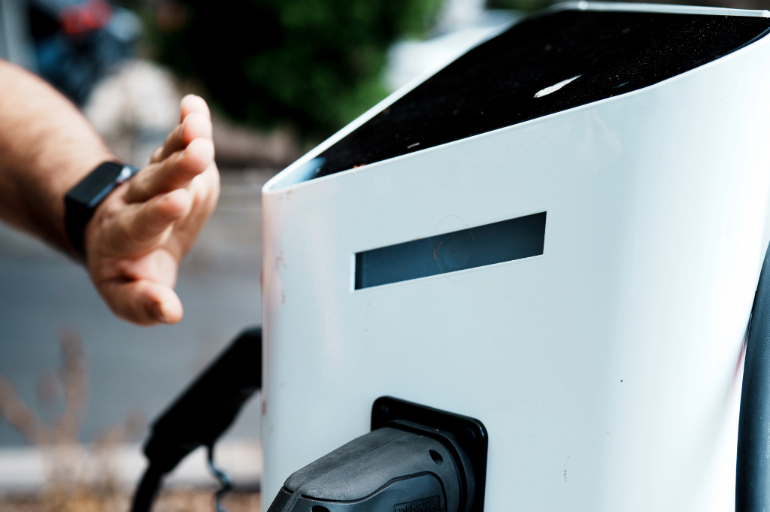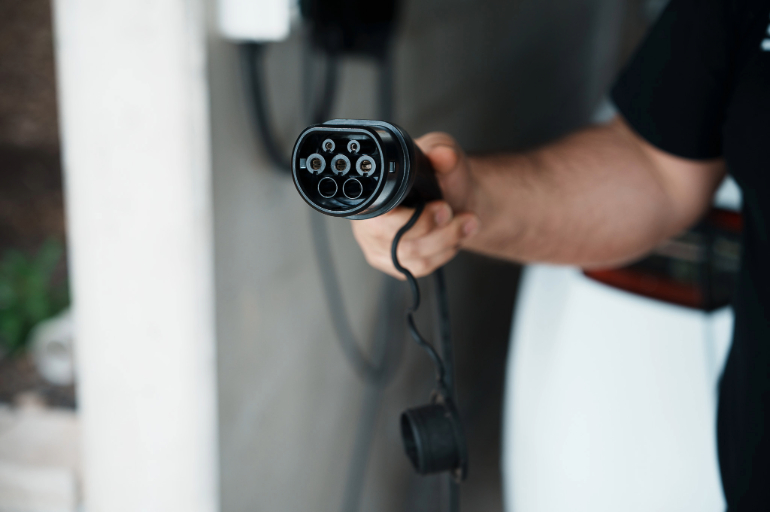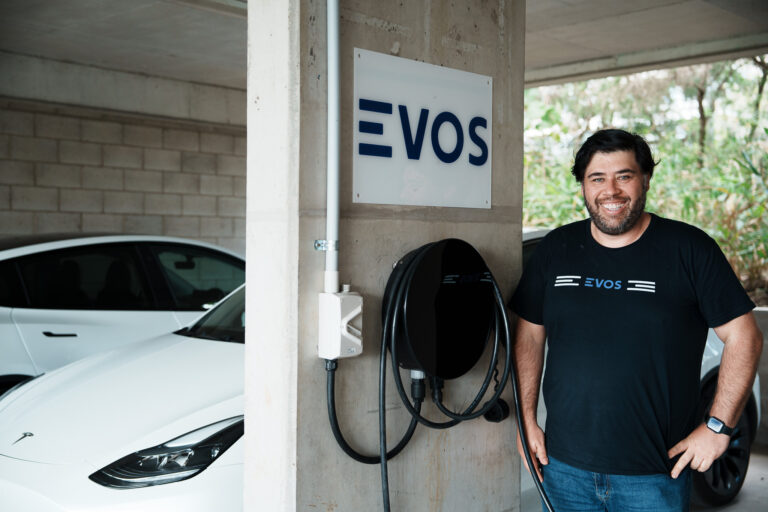Brisbane-based technology provider EVOS is charging ahead with its range of Australian-made AC chargers and management solutions aimed at helping fleets transition to net-zero.
Fleet EV News visited the EVOS team at its Brisbane headquarters to look at the solutions and software currently on offer, as well as sitting down with co-founder and CEO Marcelo Salgado to find out what the future holds for the innovative company.
Marcelo and his fellow co-founders, Seshan Weeratunga and Chris Crossman, kicked things off with an idea back in 2020. It’s where the three men came from though, that gave them an inside edge – jumping the wire from DC to AC.
“Covid hit, so that was a great time to start a business,” Marcelo laughed.
“But we actually came from the DC world. I was running around the world as the Chief Sales Officer of Tritium – all of us came from there actually – and so we were constantly talking to customers about EV charging.
“It was really clear that DC has a place, but the reality is most people charge on AC. Wherever you look at the data it’s about 90 percent AC and 80 percent of that is done at the home or workplace,” he explained.
During his time selling DC chargers, Marcelo noticed that the majority of fleet customers would actually be better off with predominantly AC infrastructure.
“When we’d talk to fleets in particular, we found that DC wasn’t quite the right solution because if you put one charger in and all your cars come back at five-o-clock when work finishes, you have to then pay someone to stay and rotate those cars,” he said.
“For the same price, you can have 10-15 AC chargers and you’ve got redundancy if one fails, then there is the improved vehicle resale value based on reduced degradation on your batteries.
“So coming from that experience, all we could see was everyone focusing on how to replace petrol stations, how to get the fastest charging, how to build the cheapest home charger, or how to build an app to get people to pay for charging.”
The piece of the puzzle the wider industry was missing, Marcelo says, was the energy management side of charging – particularly for the business and fleet world.
“The biggest EV problem is energy, not the cost of the vehicle or where you’re going to charge – it’s the energy management side of things,” he said.
“An example is downstairs here, we have seven or eight vehicles that are electric, right? We’ve got a 63-amp power feed and we’ve got 144kW of charging. When we first moved in we got a quote to upgrade to 110 amps and it was $100,000. So that’s the biggest problem businesses are going to have.”

For large fleet customers, particularly heavy vehicle operators, Marcelo says EVOS partners with DC charging providers, and its platform is ‘agnostic’ so will work across an entire charging ecosystem. For passenger car fleets though, the team is confident AC charging is the answer.
A fleet-focused feature of the EVOS system is a cents-per-kilometre (CPK) calculation that allows operators to accurately report their running costs, which Marcelo explains is far more complex than monitoring ‘litres in’ at the bowser.
“The most common thing that we heard when talking to fleets around the world was that it’s really hard for them to understand the cents-per-kilometres when it comes to EVs,” he said.
“Petrol or diesel is really easy, you sign up for your fuel card and you’ve got a pretty fixed cost, but power is multidimensional. You’ve got tariffs, network charges, and other costs depending on where you are, so it’s really hard to understand because it’s time based.
“When the energy has gone in, how much has it actually cost me? That’s what our platform does. We understand when you’ve charged, we understand what tariff you’ve used to charge and we can actually work that out.”
The EVOS system relies on an OBD2 device that authenticates the vehicle and talks to its chargers, ensuring that vehicle and charging data is relayed in real time.
“We have created our own little OBD2 tracker that allows us to understand how big the battery is and the state of charge, which gives us a massive advantage for energy management,” Marcelo said.
“It allows us to authenticate. Most customers at the moment get a third-party software layer, and then they have to use an RFID card or an app to control it. So now you plug it in and that’s the authenticator, it reads the VIN and talks to the charger and that charger will then allow it to charge. We can then do things like calculate cents-per-kilometre.”
Marcelo and his team are also gearing up to roll out a system that will monitor home charging for fleet vehicles, using the OBD device to calculate the reimbursement amount for people charging their work vehicle at home.
“There will be a lot of businesses that allow people to take the company car home to charge, so then it’s like, ‘how do you reimburse?’” Marcelo pointed out.
“We have a product in the pipeline, which uses that OBD2 device. If they’ve charged for four hours and put 33kWh into the battery, we know what tariff they’ve used and they can be reimbursed. So that little device gives you great flexibility.”
Another benefit for fleet customers, Marcelo explains, is the heavy focus EVOS places on cybersecurity which he says is lacking elsewhere in the EV infrastructure market.
“We’ve paid a lot of attention to cybersecurity, and it’s concerning to us that a lot of the other systems coming through don’t get tested, but all our systems are certified,” he said.
“We send them to Amsterdam to get tested by Dekra, and we do external cybersecurity testing, penetration testing, and we’ve got additional safety elements in the charger that are far beyond what the standards require.”

The team has seemingly thought of everything, even ensuring fleet customers can quickly replace components if they fail without having to book an electrician – which in Australia is typically not a same-day affair.
“Downtime isn’t acceptable to us, so we designed the system so that the thing that’s most likely to fail – which is the charge cable lead, but only because people drop or run over them – can be replaced. Marcelo said.
“All you have to do is isolate it and plug a new one in.”
So far, EVOS sells direct to businesses as well as providing white label chargers to major retailers like Ampol. In terms of what the future holds for EVOS, Marcelo says the focus is on solving the energy management problem’s of tomorrow.
“It’s really early in the EV curve, so we feel like a lot of the problems we try and solve haven’t been experienced by businesses yet,” he said.
“If you’re at one or two EVs, you don’t have an energy problem. As soon as you’ve got 10, 20 or 100, your energy problem starts evolving. What EVOS is really focused on is providing the best energy solutions for businesses to make sure they can run their fleets in a cost-effective way.”






